Why the Indigenous community has an affinity with rugby league
Rugby league has always been at the forefront of racial issues, with the sport priding itself on creating positive change, even before everyday society. Jamie Pandaram looks at the impact of this on Indigenous communities and their bond with the sport.
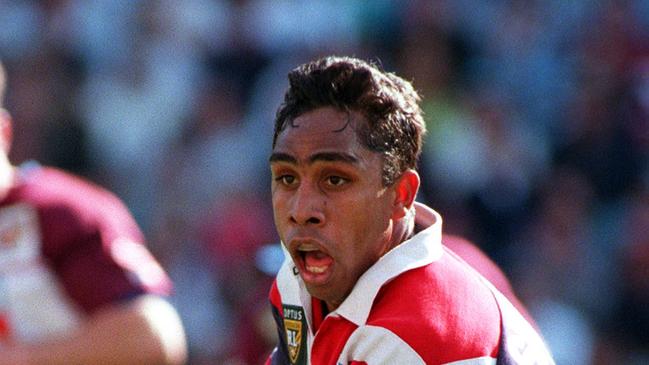
Rabbitohs
Don't miss out on the headlines from Rabbitohs. Followed categories will be added to My News.
Two years before Aboriginal Australians were allowed to vote, Lionel Morgan was allowed to represent the country in rugby league in 1960.
Before companies were willing to be led by Indigenous people, Arthur Beetson was captaining Australia for the Kangaroos.
This is why, premiership winner George Rose explains, the Indigenous community has an affinity with rugby league above all other sports.
“I do believe rugby league is ahead of the other codes,” Rose said.
“I remember Dean Widders doing a presentation a few years back talking about how a lot of social changes happened in rugby league before it happened in Australian society, things like Lionel Morgan playing back when he did, Arthur Beetson captaining Queensland and Australia in a time before there was a lot of change in Australian society in regards to attitudes towards Aboriginal people.
“There’s always been positive change happening within this sport before it’s happened in society.
“I think that’s why it’s continued to be ahead of the other codes, the acknowledgment and being embraced. The NRL has an Elevate Reconciliation Action Plan, that’s the highest level you can have in Australia, that shows the level of commitment the game is making.
“The All Stars game, Indigenous Round, there are other codes that are really good with their marketing, but what actually happens within the NRL, the work done on the ground, is a lot better than what happens in other codes.”
Legendary Queensland fullback Matt Bowen, who grew up in the small Cape York community of Hopevale, describes the lure of league.
“I’m from a small community and that’s all we knew, all we did,” Bowen said.
“My mum would tell you, every day she’d see me walking to school I had a footy, chipping and chasing everywhere.
Kayo is your ticket to the 2020 NRL Telstra Premiership. Every game of every round Live & On-Demand with no-ad breaks during play. New to Kayo? Get your 14-day free trial & start streaming instantly >
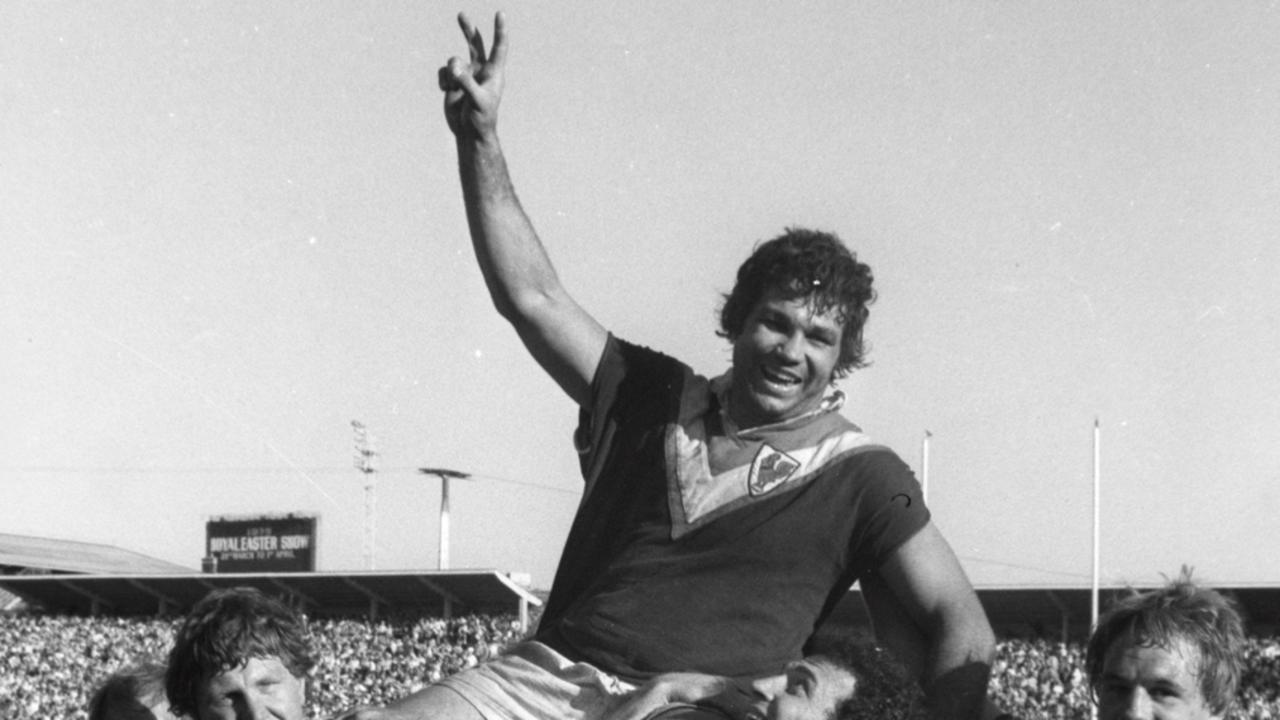
“You talk to any Indigenous kid, that’s what they want to be, they want to be Johnathan Thurston or Matty Bowen or Greg Inglis.
“It’s great to see in Indigenous Round that not only the boys, but the non-Indigenous players love to put that jersey on and cherish it.
“The Indigenous game showcases that we’re proud of our culture and representing our people, my mum and dad and grandparents got to see me put that jersey up.
“Up north, in the Cape, those kids just want to grow up to be a football player. We try to encourage them to stay in school, footy players do go to school, they do have to learn to read and write and spell, if we can keep getting that message to them we’ll have more young Indigenous players coming through.”
Rose, a university-educated man with a deep perspective, said the game has helped change views of his people when few other avenues could.
“For a long time, rugby league has been that opportunity to be accepted by everyone and created the outlet not to have to deal with the injustices and difficulty that a lot of Aboriginal people face,” Rose said.
“Once you walk out onto the footy field, or are a part of a footy team, you’re accepted. People have gravitated towards it because there is a different feeling when you’re playing and you’re a part of a team, you’re accepted more widely because of what you can do on the footy field.
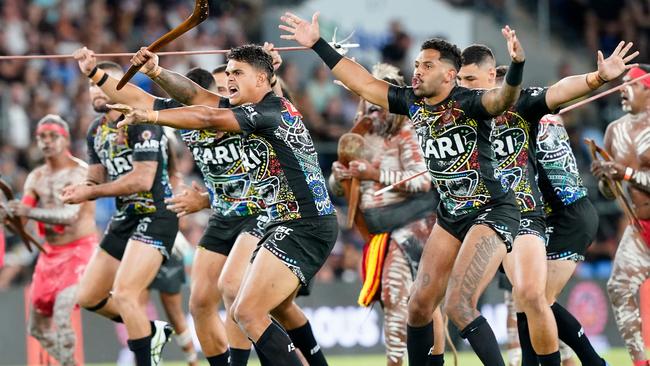
“You compare that to stereotypes that people might have of you as a person if you weren’t a rugby league player, they’re two very different things.
“Rugby league breaks down barriers, you get to know people for who they are, what they’re really about.
“We’re not taught enough about Aboriginal culture in the schooling system, there’s always negative stories and negative media shared, but we’re not all negative people. Aboriginal culture is something for Australia to be proud of, it’s 60,000 years of history.
“When you see Aboriginal people proudly representing our culture, it’s not a statement saying ‘We don’t respect you or we don’t want you to be a part of it’. We do want you to be a part of it.
“We want you to be proud of it too.
“Just learning a little bit is the key to slowly making change. At the NRL we’re to encourage positive change and get everyone along for the journey.”
NRL boss Peter V’landys admits that until speaking extensively with Manly backrower Joel Thompson late last year, he too didn’t fully understand the plight of the players in the game.
“I saw the story with Daly Cherry-Evans, and he had the same experience I had,” V’landys said.
“And Joel Thompson, in my view, is an absolute role model for Indigenous people. He’s the one that motivated me the most; where he’s come from, the life he’s had, where he is now and how he wants to contribute back is a testament of his human character, and that’s what inspired me.

“I was disappointed in myself because I met with senior Indigenous players last year, and I was uneducated in their history, and why they feel the way they feel.
“It’s important for everybody to have a better understanding of Indigenous culture.
“The other important thing for me is that, like it or not, in this society there is still racism. We need to eradicate racism.
“As far as I’m concerned, and as far as our sport is concerned, everybody is equal. It doesn’t matter where they’re from, what they look like, the thing is we’re on human beings.
“And that’s one thing that shocked me when I met with the Indigenous players – there are still elements of their communities who suffer racism.
“We need to learn from our past, because that’s not to be tolerated under any circumstances.
“That’s why I’ve been so passionate about it, because they’ve motivated me, and I want to help their cause because I’m more educated about it, I know more about it now.
“We are very proud of our history in relation to Indigenous matters, we’ve probably done more than any sport over the years.”
LATEST NEWS
Sonny Bill Williams’ COVID breach: Loophole clears Roosters recruit
‘Rare talent’: Westsfields Sports High star one to watch for Bulldogs fans
SOUTHS STAR’S SHOCK BLOOD LINKS TO FREAKISH PAIR
Jamie Pandaram
It’s not every day you discover that two of the most freakish players to have ever graced NRL fields are direct blood relatives.
For Rabbitohs playmaker Cody Walker, the news he is related to Anthony Mundine and Andrew Walker was particularly rousing given he’d grown up falsely bragging to mates that he was indeed a cousin of the league star turned boxer nicknamed ‘Choc’.
“Every kid growing up says ‘He’s my cousin’, that was always the way, ‘Yeah bra he’s my cousin’, but you didn’t really know that the connection is really there,” Walker said.

NRL NEWS
What border ban means for NRL’s immediate future
‘Not here for money’: SBW’s Roosters salary revealed
“It’s a weird one about Choc, it’s hard to explain how we’re related. My pop’s brother married a Mundine, I always thought I was related to Choc through marriage.”
The discovery was made just two years ago, after his mother, Linda Stewart, died of a heart attack.
“When my mum passed away, we actually sat around a table, just talking,” Walker said.
“It was after we played the Knights, my dad was there, my three older brothers were there, we were having a few beers and started talking about it.
“I didn’t know we were related to him, and they broke it down and I was like ‘wow’.”
And there was another shock to come.
“Andrew Walker,” he said.
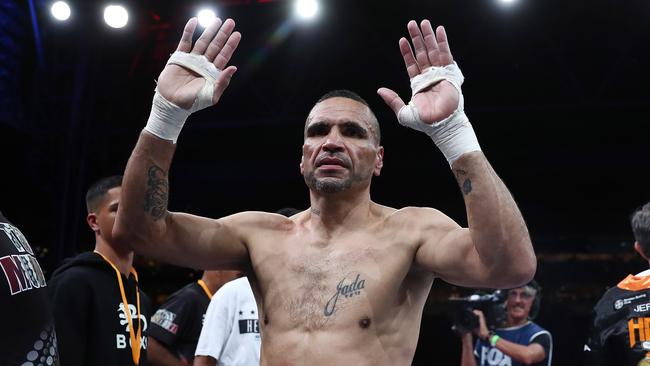
MORE NEWS
Paul Kent: NRL risk as it considers South Sydney’s Joseph Suaalii exemption
Canterbury Bulldogs: Adam Elliott in the sights of NZ Warriors
“We had a family reunion down the south coast, I went down there and his dad was there, and there’s a guy who we are all direct descendants from, they called him ‘King’, we are all direct descendants of this Walker.
“I didn’t think I was related to him while he was playing footy, I only found out a few years ago.”
It is emblematic of Indigenous culture that Walker, 30, can still be learning so much about his own heritage and family tree well into adulthood.
Just a fortnight ago, it was confirmed that scientists had determined from ancient mussel shells in South Australia’s Riverland that Indigenous people had occupied the area 29,000 years ago – it had been assumed they’d started living there 5000 years ago.
The understanding of Australia’s vast Indigenous history is crucial to Walker’s outlook.
“We want to teach our kids all about our culture, it’s such a proud part of my life and how I grew up,” Walker said.
“One of the biggest things we’ve lost in Aboriginal culture is our identity, our language, our storytelling, our way of life, our lore.
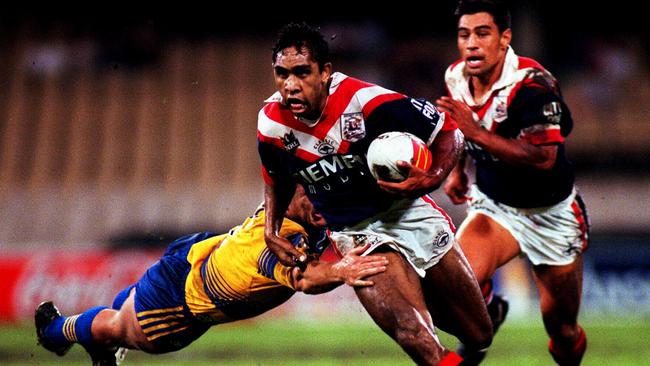
“These are things we’ve lost throughout our history. To make sure these things aren’t lost altogether, we have to continue to learn about our culture.
“I don’t know everything, I don’t have all the answers. I’m continually learning as I go.
“We as Aboriginal people need to reconnect with our culture whenever we can so our kids can grow up being proud Aboriginal people.
“Whenever I go home, I do things on the land, hunt and gather like we used to, go turtle diving.
“Our country up home, we’d go diving for little river turtles, so I’m making sure my kids are introduced to that.
“I haven’t done it for a couple of years, my youngest hasn’t done it yet, but we did it a couple of Christmases ago, I took him down, he couldn’t swim but I showed him the turtles.
“We went kangaroo hunting as well, I’m encouraging all of my kids to practice their dances, making sure they’re still proud to get up and do the shake-a-leg.
“I’ve been a proud Aboriginal man since as long as I can remember.”
That’s why Walker is an enthusiastic in helping the next generation of Indigenous men and women finding confidence and solving glaring problems that exist today.
“Aboriginal people die 10 years younger than non-Aboriginal people, the health issues we face, we’re more prone to heart disease, more prone to chronic diseases, we’re less likely to get a job because of who we are, appearances, and they’re facts,” he said.
“My job as an Aboriginal athlete, and my responsibility as a role model, is to upskill our own people to be able to be confident in going for jobs.”
Originally published as Why the Indigenous community has an affinity with rugby league


